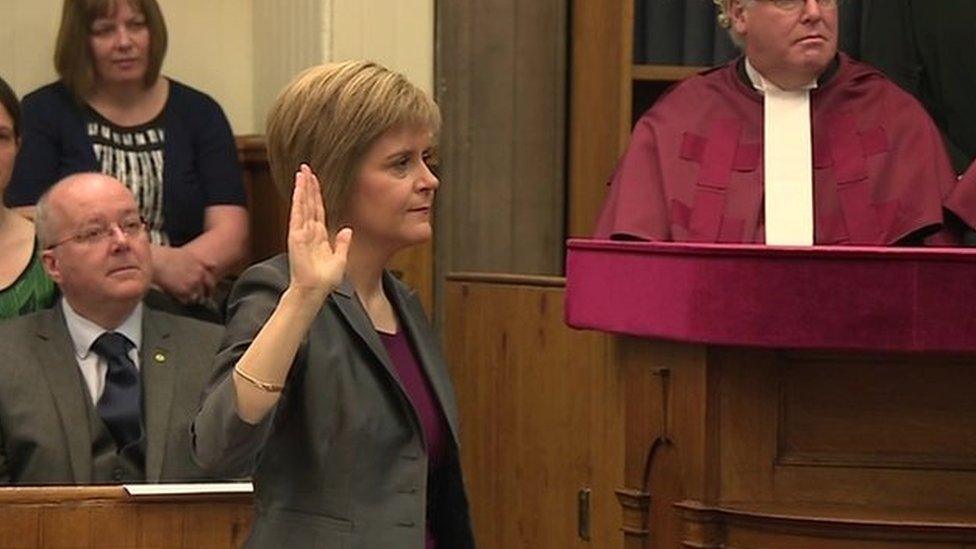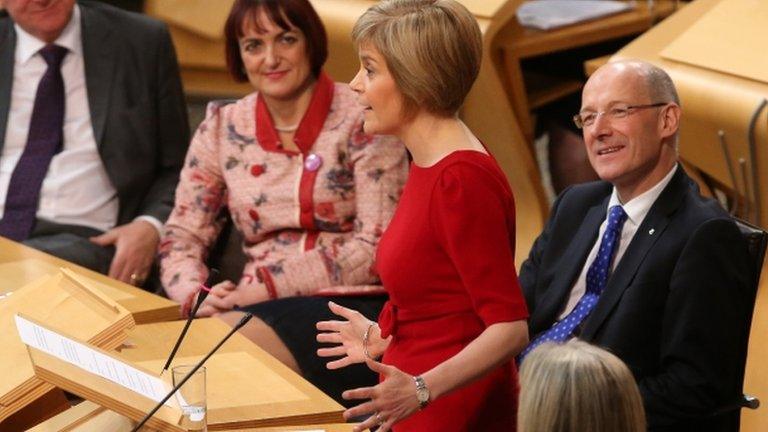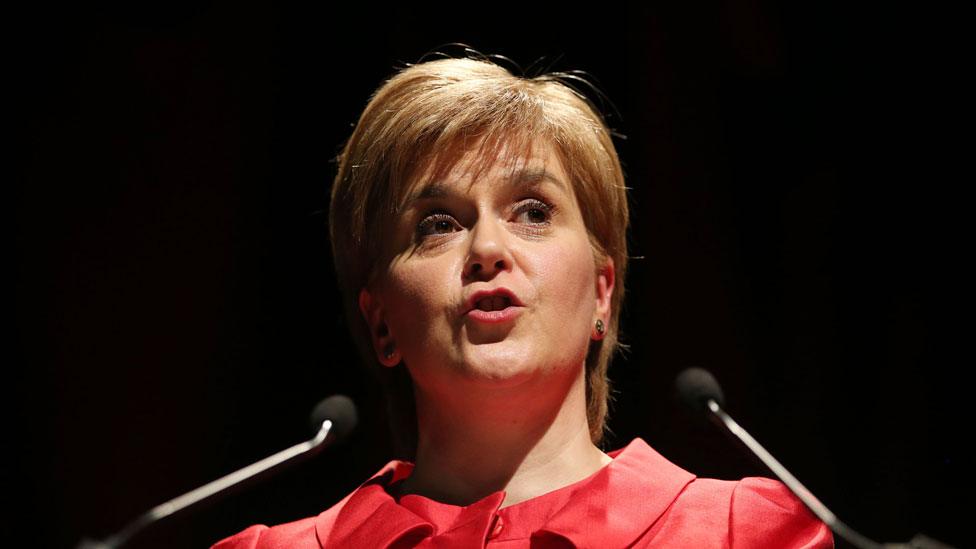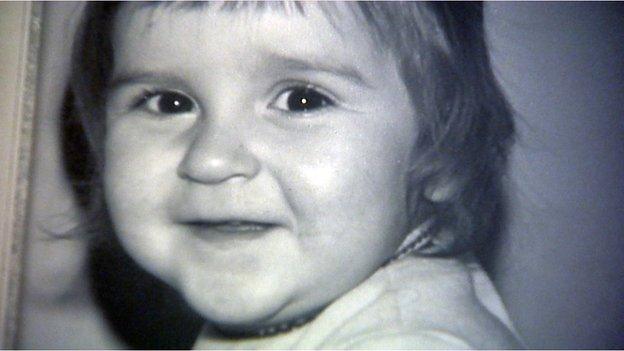Nicola Sturgeon in 'open' offer to rivals
- Published
Scotland's new first minister has said she would consider any suggestions from political rivals to help her government do a better job.
Nicola Sturgeon used her first day in the post to eschew "the usual defensive ding dong" in favour of a more open-minded approach.
The comments came as the SNP administration was accused of failing on justice and cancer treatment.
The opposition grilling came during question time in the parliament.
The first minister told MSPs: "I am open minded to any proposals that come forward from any side of the chamber as to how the government can do things better."
She added: "This is my first day in office - I could stand up here in response to any of the questions I'm asked and engage in the usual defensive ding dong - I daresay there will be weeks when I do exactly that.
"But today of all days, I want to make very clear. I'm a new first minister. I'm a proud member of the government for seven years, but I want to come into this job with an open mind."
Under opposition questioning, Labour's Jackie Baillie said the government had failed to ensure cancer patients got equal access to drug treatment.
She raised the case of Jean MacDonald, a Glasgow woman with leukaemia, who Ms Baillie said had to find £38,000 to pay for drugs which were freely available to patients in Edinburgh.
"I'm sure the first minister would agree with me that just isn't right," sais Ms Baillie, adding: "Can the first minister tell me when she will end the postcode lottery for cancer patients across Scotland that her health secretary promised to happen by May?"
Ms Sturgeon, who was earlier sworn in as Scotland's first minister in front of judges at Edinburgh's Court of Session, said she wanted an end to postcode lotteries in all healthcare.
Party lines
She said work was under way to improve decision-making at the Scottish Medicine Consortium, which looks at the use of drugs in the NHS, as well as health boards.
Again appealing for consensus, the first minister, added: "On this issue, possibly above all other issues, it's important that we don't divide on party lines - these are matters of life and death for many people."
Scottish Conservative leader Ruth Davidson attacked current policy which allows the automatic early release of prisoners, which the government plans to end for the most serious offenders with new legislation.
Ms Davidson raised the case of Erin O'Neill, who spoke out following her rape by offender Ross Wright, after he was released early from prison for serious assault having serving half his sentence.

ANALYSIS
By Brian Taylor, BBC Scotland political editor

Will Holyrood in future see much "ding dong", as actor Leslie Phillips would put it?
The new first minister sought to lighten the load a little by urging consensus on all sides - or at least a common endeavour in seeking solutions to commonly discerned problems.
This was not an accidental aside but a clearly calculated strategy.
Ms Sturgeon noted that she would eschew the "usual defensive ding dong" of political insult. But, perhaps inspired by her visit to the Court of Session, she quickly lodged a caveat. (Her legal training still comes in handy.)
The caveat? That she might have to rely upon political knockabout at some point in the future. Ding, dong, as Leslie Phillips would say. (Ask your parents. Or grandparents.)
For today, only, Ms Sturgeon's opponents seemed prepared to join in the consensus game. (Ping pong?) Either that or her pitch was effectively delivered - which it was. Or indeed both.

The Tory leader, said: "Ross Wright was freed because of the absurd rule of automatic early release - we've been calling for that law to be scrapped for a number of years.
"The Scottish government has now published plans to address this, but they will only cover a derisory number of cases. Doesn't the first minister see these plans are utterly inadequate?"
Nicola Sturgeon was sworn in in a simple ceremony at the Court of Session in Edinburgh
Ms Sturgeon, who paid tribute to Ms O'Neill's bravery, responded: "We're about to go into a parliamentary process, where any member, including Ruth Davidson, will be able to put those views forward and propose amendments to the bill."
Sticking with justice, Scottish Liberal Democrat leader Willie Rennie said the SNP government had "mishandled" plans to end the requirement to corroborate evidence in criminal trials, as he also hit out at the "routine" arming of police and the carrying out of stop-and-search procedures on children.
Naming the justice secretary - and ahead of an expected government reshuffle this week - Mr Rennie said: "Everyone knows Kenny MacAskill is going - but which of his policy failures are staying?"
Ms Sturgeon said there was "a lot to be proud of" in the justice system, and, repeating her earlier offer, told the Lib Dem leader: "My door is open for sensible discussion around any policy that any member wants to discuss.
"I can't promise I'll agree with them on anything, but where we can find common ground, I am certainly willing to try to find it."

How social media reacted to FMQs










- Published20 November 2014

- Published19 November 2014

- Published26 May 2017

- Published19 November 2014
